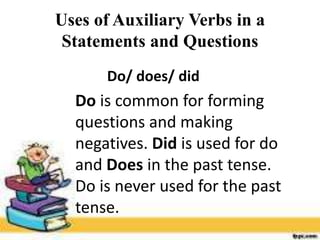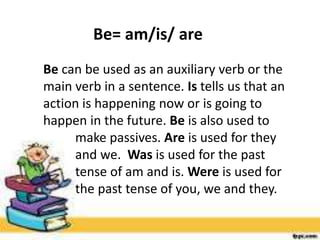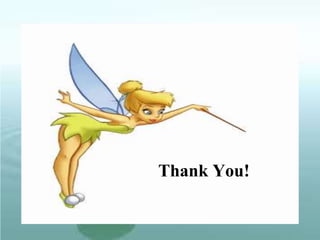Auxiliary verbs
- 2. What is
- 3. An auxiliary verb is used to add functional or grammatical content to the information expressed by another verb, considered to be the main verb.
- 4. Are function words, a type of closed class which is constituted of words that have grammatical function as opposed to content words, which are open class of lexical words.
- 5. Examples • I am writing a book. • He has done the work. • We will be there in a minute. • Would you help me with this homework? • Can you open the door? • Did you visit New York last holiday? • Do you like chocolates? • They must get there on time.
- 6. The 23 Auxiliary Verbs Am Is Are Was Were Has Have Had Do Does Did Will Would Shall Should Can Could May Might Must Be Been Being
- 7. Uses of Auxiliary Verbs in a Statements and Questions Do/ does/ did Do is common for forming questions and making negatives. Did is used for do and Does in the past tense. Do is never used for the past tense.
- 8. Be= am/is/ are Be can be used as an auxiliary verb or the main verb in a sentence. Is tells us that an action is happening now or is going to happen in the future. Be is also used to make passives. Are is used for they and we. Was is used for the past tense of am and is. Were is used for the past tense of you, we and they.
- 9. Have= has/ had Have is used to make the perfect tense(it always followed by the past participle). Has is used for the third person singular. Had is used for past tenses especially the past perfect tense. It describes an action that began in the past and continues into the present or that occured in the recent past.
- 10. Other Common Auxiliary Verbs Can Could May Might Must Ought Should would These are also known as modal verbs. We used them to show obligation, possibility and necessity.
- 11. Lets Have a Quiz!
- 12. Directions: Tell whether if the bold word in the sentences is an auxiliary or a full verb. 1. Dad is working in the garden. 2.We do the shopping once a week. 3.These students never have classes on Fridays. 4.What do you do for a living? 5.The kids were dancing to the music.
- 13. 6.Did you see him? 7.The door is closed. 8.Where have you been? 9.My parents are on holiday. 10.I had just finished my breakfast when the phone rang.
- 14. 1. auxiliary verb 2. full verb 3. full verb 4. auxiliary verb 5. auxiliary verb 6. auxiliary verb 7. auxiliary verb 8. auxiliary verb 9. full verb 10. auxiliary verb Answers:
- 15. Thank You!














